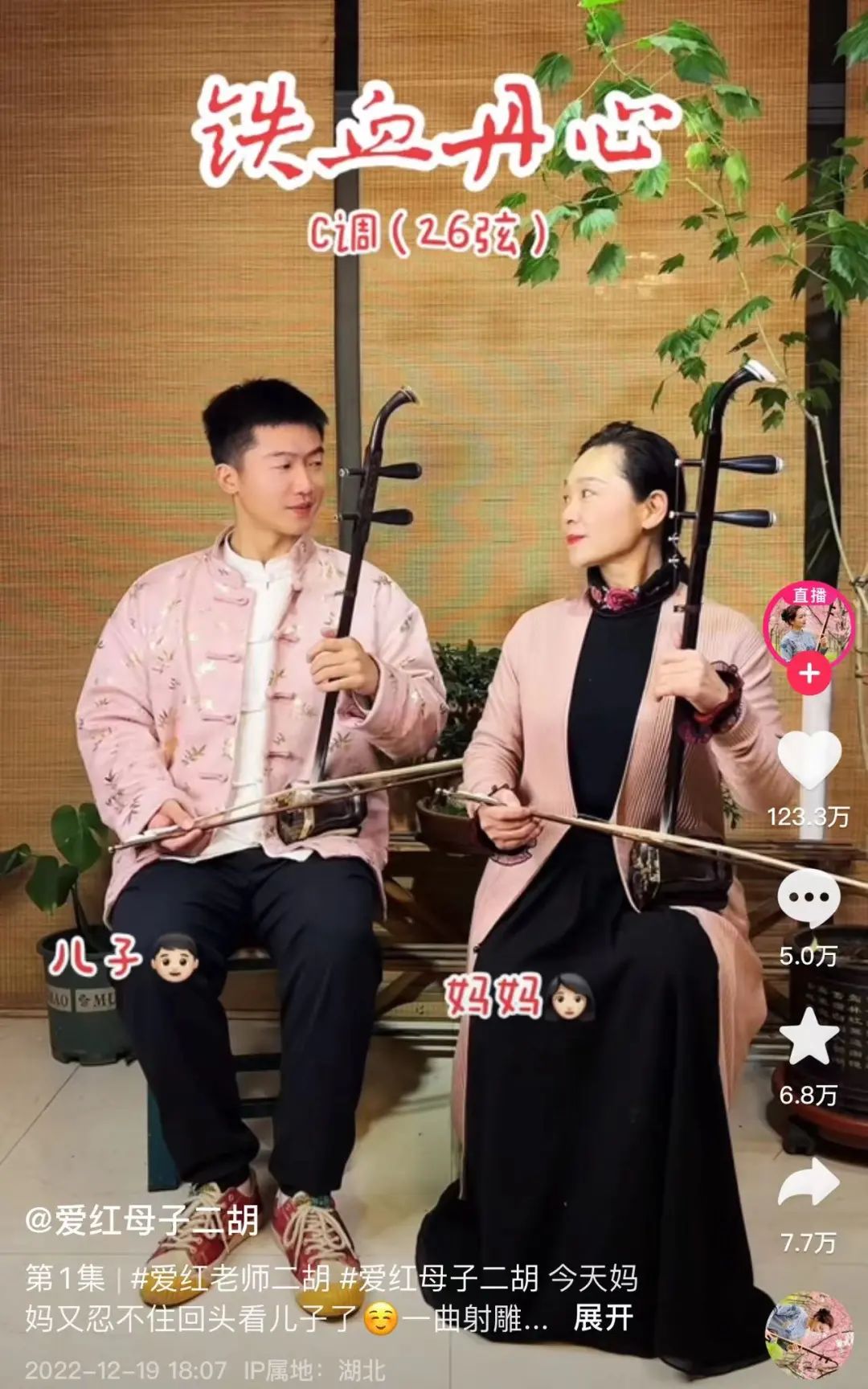Chinese mother-son erhu duo wins popularity online for tacit cooperation
A Chinese mother named Ai Hong and her son, Li Xianghe, have recently gone viral due to their tacit partnership while performing together on the erhu, a traditional Chinese two-stringed bowed musical instrument.
Ai is a national first-class erhu player, and her son is also a professional musician. They have performed together for many years, and can quickly understand each simply through eye contact.

Li Xianghe and Ai Hong perform in a livestreaming session. (Photo/China Youth Daily)
Every time they perform together, they give off a magical vibe. Ai always looks at her son out of habit when they finish playing a tune, and the tacit understanding between them has touched the hearts of millions of netizens.
So far, they have accumulated more than 1.2 million followers on China's short-video sharing platform Douyin.
Influence by her father, Ai started to learn the erhu when she was a teenager, and her son begun his musical journey when he was about 7.
Li learned to play the erhu from his mother, who was a very strict teacher, he recalled.
Li's first time performing the erhu in public was at the birthday party of a close friend. Too shy to play in front of an audience, he asked his mother to perform together with him. Eventually, they agreed that the mother would give the son guidance on the performance with her eyes.

Photo shows Li Xianghe. (Photo/China Youth Daily)
They have kept their habit of communicating through eye contact for the 20 years since then.
The special duo's rise to online fame began with a short video that Li made of him and his mother playing the erhu together, which he posted online without giving it too much thought. To his surprise, the video quickly went viral, and was followed by a rapid increase in the number of followers on Li and his mother's Douyin account.
This unexpected path to fame has motivated the duo to join the wave of traditional Chinese music performance livestreamers. Since October 2022, the mother-son duo have livestreamed their performances online.
"Planning a livestreaming show is like planning a party. During the show, I need to act as the host and the performer while interacting with the audience," Li said.
Growing up, Li was questioned a lot about learning to play the erhu, as it is one of the traditional Chinese musical instruments people generally think that only older people know how to play. When he was in elementary school, he was the only student who could play the erhu, and was often asked by his schoolmates, "Isn't the erhu usually played by old men?"
It makes him very happy that such questions have been asked much less since he started to post videos of himself and his mother playing the erhu together. A growing number of Internet users have been drawn to their videos, and fallen in love with traditional Chinese music as a result.
In addition, the duo were delighted to find that their performances have attracted people of all ages, from the elderly to kindergarten children.
Some parents asked them to play tunes that are popular with toddlers. One mother said in the comments section of a video that her son became fascinated by the erhu after he heard how it could produce lifelike sounds of horses whinnying in the performance of the famous erhu solo musical piece "Horse Racing".
“The erhu can produce many kinds of sound effects," Li said, adding that he has decided to perform more pieces that children will like in his shows.
People from two generations performing traditional Chinese music together can attract more age groups, according to Li, who has realized that it's very important for traditional forms of art to integrate with new stages.
Besides Li and his mother, more traditional Chinese musical instrument players have actively embraced short video platforms to expand their stage and find new audiences, commented an article published on the website of Guangming Daily.
These online performers have made it easier for people to enjoy traditional Chinese music, and brought musicians closer to their audiences, the article said.
Photos
Related Stories
- Technology drives development of Chinese string musical instrument in Yangzhou
- Chinese, Greek musicians build communication bridge at Athens concert
- Band made up of foreign students introduces China to world through music
- Yin Lin revives ancient Chinese music stylings
- Edward McGuire: Exploring the meeting point of music of the East and the West
- Feature: China Now Music Festival kicks off new season in New York City with "Tales from Beijing"
- Music traditions stoke artistic passion in China's ice city
- British singer combines Chinese elements with his music
- Video game CS:GO introduces first music kit in Chinese to celebrate 5th anniversary
- 'Post-95s' couple goes viral for Chinese dulcimer livestream performances
Copyright © 2023 People's Daily Online. All Rights Reserved.









